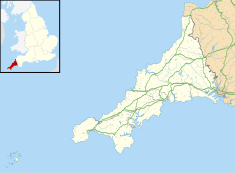
Bodmin is a town and civil parish in Cornwall, England, United Kingdom. It is situated south-west of Bodmin Moor.

Cornwall is a ceremonial county in South West England. It is recognised by Cornish and Celtic political groups as one of the Celtic nations, and is the homeland of the Cornish people. The county is bordered by the Atlantic Ocean to the north and west, Devon to the east, and the English Channel to the south. The largest settlement is Falmouth, and the county town is the city of Truro.
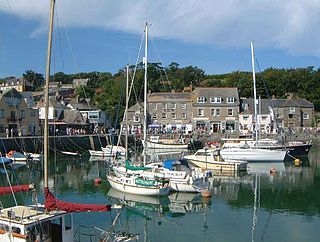
Padstow is a town, civil parish and fishing port on the north coast of Cornwall, England, United Kingdom. The town is situated on the west bank of the River Camel estuary, approximately 5 miles (8.0 km) northwest of Wadebridge, 10 miles (16 km) northwest of Bodmin and 10 miles (16 km) northeast of Newquay. The population of Padstow civil parish was 3,162 in the 2001 census, reducing to 2,993 at the 2011 census. In addition an electoral ward with the same name exists but extends as far as Trevose Head. The population for this ward is 4,434.

Truro is a cathedral city and civil parish in Cornwall, England, United Kingdom. It is Cornwall's county town, sole city and a centre for administration, leisure and retail trading. Its population was 18,766 in the 2011 census. People of Truro can be called Truronians. It grew as a trade centre through its port and as a stannary town for tin mining. It became mainland Britain's southernmost city in 1876, with the founding of the Diocese of Truro. It is home to Cornwall Council, the Royal Cornwall Museum, Truro Cathedral, the Hall for Cornwall and Cornwall's Courts of Justice.

Newquay is a town on the north coast in Cornwall, England, United Kingdom. It is a civil parish, seaside resort, regional centre for aerospace industries with an airport and a spaceport, and a fishing port on the North Atlantic coast of Cornwall, approximately 12 miles (19 km) north of Truro and 20 miles (32 km) west of Bodmin.

Redruth is a town and civil parish in Cornwall, England, United Kingdom. The population of Redruth was 14,018 at the 2011 census. In the same year the population of the Camborne-Redruth urban area, which also includes Carn Brea, Illogan and several satellite villages, stood at 55,400 making it the largest conurbation in Cornwall. Redruth lies approximately at the junction of the A393 and A3047 roads, on the route of the old London to Land's End trunk road, and is approximately 9 miles (14 km) west of Truro, 12 miles (19 km) east of St Ives, 18 miles (29 km) north east of Penzance and 11 miles (18 km) north west of Falmouth. Camborne and Redruth together form the largest urban area in Cornwall and before local government reorganisation were an urban district.
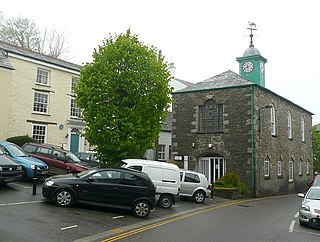
Camelford is a town and civil parish in north Cornwall, England, United Kingdom, situated in the River Camel valley northwest of Bodmin Moor. The town is approximately ten miles (16 km) north of Bodmin and is governed by Camelford Town Council. Lanteglos-by-Camelford is the ecclesiastical parish in which the town is situated. The ward population at the 2011 Census was 4,001. The town population at the same census was 865.

Saint Austell is a town in Cornwall, England, United Kingdom, 10 miles (16 km) south of Bodmin and 30 miles (48 km) west of the border with Devon.

Wadebridge is a town and civil parish in north Cornwall, England, United Kingdom. The town straddles the River Camel five miles upstream from Padstow. The permanent population was 6,222 in the census of 2001, increasing to 7,900 in the 2011 census. There are two electoral wards in the town. Their total population is 8,272.

Cornwall Council, known between 1889 and 2009 as Cornwall County Council, is the local authority which governs the non-metropolitan county of Cornwall in South West England. Since 2009 it has been a unitary authority, having taken over district-level functions when the county's districts were abolished. The non-metropolitan county of Cornwall is slightly smaller than the ceremonial county, which additionally includes the Isles of Scilly. The council has had a Conservative Party majority since the 2021 local elections. Its headquarters is Lys Kernow in Truro.

Cornwall is administered as a county of South West England whose politics are influenced by a number of issues that make it distinct from the general political scene in the wider United Kingdom, and the political trends of neighbouring counties. Its position on the geographical periphery of the island of Great Britain is also a factor.
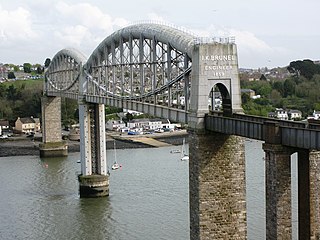
The Cornish Main Line is a railway line in Cornwall and Devon in the United Kingdom. It runs from Penzance to Plymouth, crossing from Cornwall into Devon over the Royal Albert Bridge at Saltash.

Kresen Kernow in Redruth, United Kingdom is Cornwall's archive centre, home to the world's biggest collection of archive and library material related to Cornwall. Funded by the National Lottery Heritage Fund and Cornwall Council and opened in 2019, it brings together the collections which were previously held at Cornwall Record Office, the Cornish Studies Library and Cornwall and Scilly Historic Environment Record as well as in various outstores.
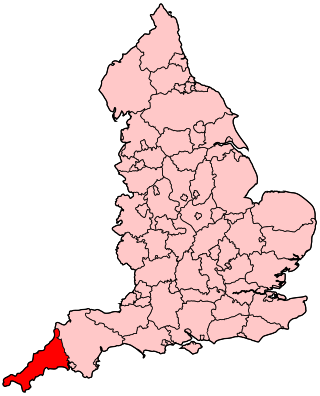
The following outline is provided as an overview of and topical guide to Cornwall: Cornwall – ceremonial county and unitary authority area of England within the United Kingdom. Cornwall is a peninsula bordered to the north and west by the Celtic Sea, to the south by the English Channel, and to the east by the county of Devon, over the River Tamar. Cornwall is also a royal duchy of the United Kingdom. It has an estimated population of half a million and it has its own distinctive history and culture.

Kernow is a bus company operating services in Cornwall, England. It is part of First South West, a subsidiary of FirstGroup.
Presented below is an alphabetical index of articles related to Cornwall:

Bert Biscoe DL, also known by the bardic name Viajor Gans Geryow, is a Cornish politician, historian and bard of the Cornish Gorseth. Biscoe represented Cornwall Council's Truro Boscawen District as an independent Cornwall Councillor until 2019, serving as an independent Truro City Council Councillor for the new Boscawen & Redannick Ward.

Lys Kernow, known as New County Hall between 1966 and 2009, is a municipal facility at Treyew Road in Truro, Cornwall. Dalvenie House, which is at the north end of the site, is retained for use as the county register office. The building, which serves as the headquarters of Cornwall Council, is a Grade II listed building.
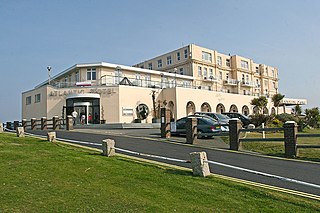
The Atlantic Hotel is in Newquay, Cornwall, United Kingdom. It was first opened in July 1892 and occupies a prominent position on the shore, with views of the Atlantic Ocean & the North Cornish coast.

Shire Hall is a former judicial facility at Mount Folly Square in Bodmin, Cornwall. It was the main courthouse in Cornwall from 1838 to 1988. It is a Grade II* listed building.

